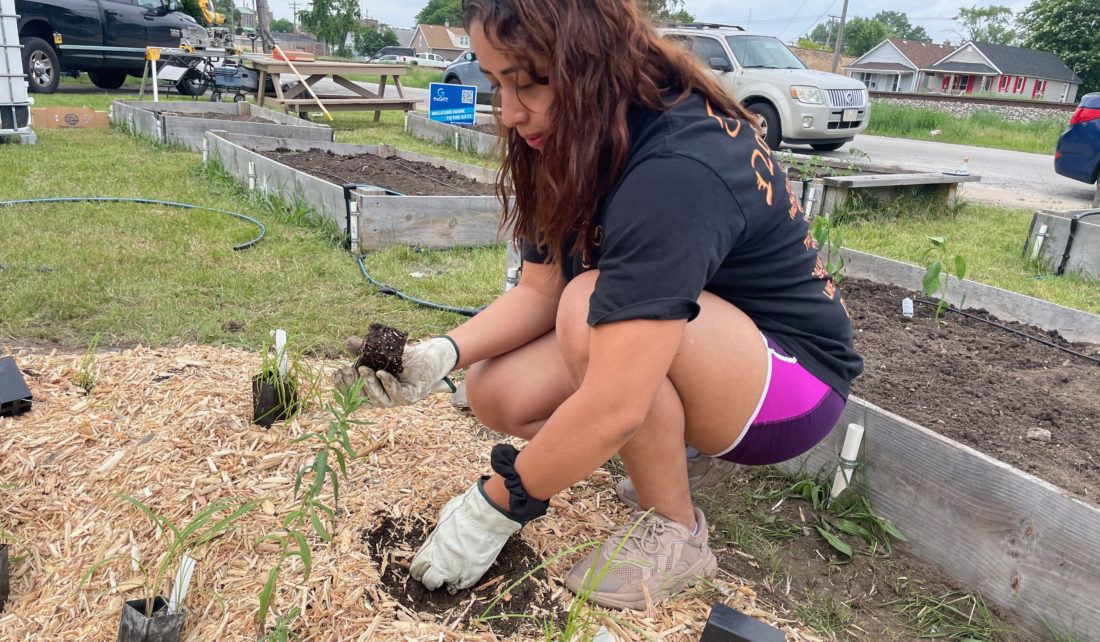
I’m proud to share with you some of Illinois-Indiana Sea Grant’s (IISG) recent accomplishments, covering a few of the multitude of water resource issues that we focus on.
First off, this summer, IISG completed our portion of a multi-state funded project to support stormwater management through green infrastructure activities at a very local level—in fact, this project is called One Block at a Time.
Working in Northwest Indiana, Kara Salazar, former Purdue faculty member Sara McMillan, and their team of interns and community collaborators helped install rainwater harvesting structures and accompanying rain gardens in Hammond and Michigan City. These installations support community resilience by providing more water to irrigate heavily used community gardens and managing rainwater on site to alleviate flooding and polluted runoff.
In high school classrooms, Andrew Coursey is helping teachers engage their students in a unique STEM education experience—through aquaponics. He has developed a curriculum and with donated equipment, helped nine Indiana teachers set up these systems in which fish and plants grow separately but interdependently.
Now, Andy is working with the Chicago High School for Agriculture, which has a grant to establish an aquaponics system on their large campus. At the other end of the spectrum, he is planning to adapt the curriculum for use in classrooms that do not have access to an aquaponic system.
Our upcoming issue of The Helm magazine highlights a climate planning survey in which an overwhelming 90% of responding local officials, natural resource managers, and other relevant professionals in the greater Chicago area in Illinois and Indiana reported that the climate in their location is changing.
This study, led by Veronica Fall, repeated a survey from 2012, providing insight into evolving attitudes and actions of local officials. Then, 61% of respondents reported that their local climate was changing. In terms of specific climate change concerns, in 2020, 76% said information related to flooding was extremely important, which is notably higher than 56% in 2012.
Another study described in the Helm focused on three Lake Michigan Areas of Concern (AOCs) to assess what drives revitalization in communities where contaminated waterways are cleaned up. Assistant Director Stuart Carlton was part of a team that undertook case studies of both Muskegon Lake and White Lake AOC communities in Michigan and those along the Grand Calumet River AOC in Indiana.
One factor that can make a difference is having large (or anchor) institutions, such as colleges or hospitals in communities. Local events, including art shows and festivals, that draw more people to the river or lake also drive revitalization. They can serve to celebrate success during the cleanup process, but also to change perceptions of the status of a waterway, which have a long history of being viewed by the public as polluted and degraded.
We also welcome new members to the IISG team.
Katie O’Reilly has joined IISG as an aquatic invasive species (AIS) specialist. She holds a Ph.D. in biological sciences from the University of Notre Dame, engaging in her doctoral (and postdoctoral) research in the Stream and Wetland Ecology Laboratory. Katie has a strong presence on Twitter as @DrKatfish where she shares knowledge and enthusiasm for Great Lakes and other fish. Katie is also a previous IISG Knauss fellow.
Along with the rest of the AIS team, Katie will engage in outreach to raise awareness of the threat of aquatic invasive species in the Great Lakes and other water bodies.
Speaking of Great Lakes fish, our fisheries specialist, Mitch Zischke, has moved on to other opportunities and Peter Euclide, a Purdue University fisheries biologist, will step into this role, part time. His initial focus will be on continuing workshops with fishers in Illinois and Indiana to keep them informed on the latest Lake Michigan fishery research and issues facing the fishery.
Tomas Höök
Director, Illinois-Indiana Sea Grant
Illinois-Indiana Sea Grant is a partnership between NOAA, University of Illinois Extension, and Purdue University Forestry and Natural Resources, bringing science together with communities for solutions that work. Sea Grant is a network of 34 science, education and outreach programs located in every coastal and Great Lakes state, Lake Champlain, Puerto Rico and Guam.

